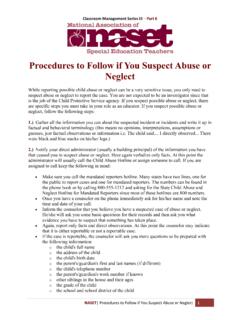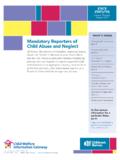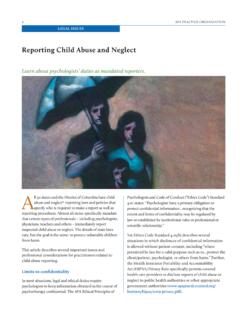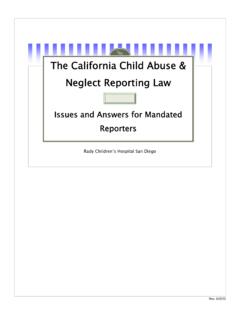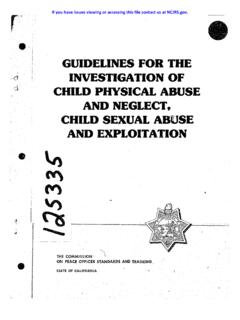Transcription of ELDER ABUSE AND NEGLECT: PREVENTING, RECOGNIZING, …
1 HCPro, Inc. 2004, all rights reserved 800-650-6787 ELDER ABUSE AND neglect : PREVENTING, RECOGNIZING, AND REPORTING: TEACHING PLAN Teaching Plan Give each learner a copy of the corresponding Learner Guide. For self-study, the learner may read this Teaching Plan and the Learner Guide and take the test. Types of ABUSE Introduce the lesson to your Learners by asking them to do the Ways Elders are Abused Matching Activity on the Learner Guide, either individually or as a group. Answers: ; ; ; ; ; Ask if anyone can add anything to Other Ways Elders Are Abused. Who Are the Victims? State that the typical ABUSE victim lives with and depends on a family member for daily care, but ABUSE is also a problem in institutional settings.
2 Most victims are female, age 75 or over, with a mental or physical illness. Most are completely dependent on the abuser. Who Are the Abusers? State that most abusers are relatives who take care of the elderly person. The abusers may have problems such as alcohol or drug dependence, emotional or mental illness, or stress. Many times the abusers need as much help as the victim. Lesson Overview Time: One Hour This lesson is required by many state regulatory agencies on an annual basis for staff in facilities that care for the elderly. It covers the prevention, recognition, and reporting of ELDER ABUSE and neglect . Learning Goals At the end of this session, the learner will be able to: 1.
3 Define different kinds of ABUSE and neglect . 2. Identify symptoms of caregiver stress that could lead to ABUSE or neglect . 3. List ways to prevent ABUSE and neglect . 4. Recognize signs of ABUSE and neglect . 5. Know how to report ELDER ABUSE and neglect . Caregiver Stress Explain that caregiver stress can be a problem for anyone caring for the elderly, and that this can lead to ABUSE in an institutional setting. Instruct the learners to fill out the questionnaire Are You An Overly Stressed Caregiver? Ask for discussion. Point out that this questionnaire could be used for family caregivers as well. Preventing ABUSE and neglect Point out the ideas for preventing ABUSE at the bottom of the Learner Guide s first page.
4 State: 1. Professional caregivers have valuable skills about ways to care for the elderly. Work is less stressful when we know how to do it well. We can also teach these skills to family We can help each other by listening while we vent frustrations, and by working together to solve problems. We can help family members by listening to their frustrations. 3. We must observe the elderly person s rights at all times, and teach them to others. Recognizing ABUSE and neglect Review the signs of ABUSE and neglect , and point out that some of these could happen even in a facility that cares for the elderly. Everyone should be alert to the signs. Ask volunteers to read the case studies to the group.
5 Call for answers & discussion. Answers: 1. verbal; 2. rights violation; try putting the mattress on the floor; 3. physical; document and report the bruises to supervisor, supervise visits between Mrs. Johnson and her son, and supervisor report possible ABUSE to authorities. Reporting ABUSE and neglect Explain your facility s and your state s reporting procedures, giving the appropriate regulatory agency s name and number to the learners. Give learners a copy of the statement of resident or ELDER rights for your state. Test & Certificate--Answers: ; , b, c; ; ; ,b; ,c; ,c; 8.(#); ; 10. respect. ELDER ABUSE and neglect Teaching Plan Page 1 of 5 ELDER ABUSE AND neglect : PREVENTING, RECOGNIZING, AND REPORTING: LEARNER GUIDE ELDER ABUSE : Any mistreatment or neglect of an elderly person.
6 Everyone has the right to be treated with respect. There is no acceptable excuse for ABUSE and neglect of the elderly, but recognizing and preventing the problem of caregiver stress may help prevent some ELDER ABUSE . Ways Elders Are Abused Match the Definition to the Term: 1. _____ Psychological ABUSE 2. _____ neglect 3. _____ Physical ABUSE 4. _____ Rights Violations 5. _____Financial ABUSE 6. _____Sexual ABUSE a. Stealing or mismanaging the money, property, or belongings of an older person. Also called exploitation. b. Using physical force to cause physical pain or injury. c. Failing to provide something necessary for health and safety, such as personal care, food, shelter, or medicine.
7 D. Causing emotional or psychological pain. Includes isolation, verbal ABUSE , threats, and humiliation. e. Confining someone against his will, or strictly controlling the ELDER s behavior. Includes improper use of restraints and medications to control difficult behaviors. f. Forcing sexual contact without the ELDER person s consent, including touching or sexual talk. Other Ways Elders Are Abused: Overmedicating Denying aids such as walkers, eyeglasses, or dentures Dirty living conditions Inadequate heating and air conditioning Are You An Overly Stressed Caregiver? Answer these questions yes or no.
8 1. I am frequently unable to sleep because I have so much on my mind. _____ 2. Most of the time I don t feel very good. _____ 3. I have difficulty concentrating, and often forget to do routine tasks. _____ 4. I feel depressed or sad much of the time. _____ 5. I feel worried and anxious almost all the time. _____ 6. I lose my temper easily and become angry at other people. _____ 7. I don t think there s anything wrong with me, I just wish everyone else would stop doing things that upset me. _____ 8. Most days I feel irritable and moody, often snapping at others. _____ 9. I feel tired almost all the time, and just drag myself through my days. _____ 10.
9 I m too busy to do anything fun or to go out with my friends. _____ Any yes answers could be a sign of excessive stress. More than three yes answers should prompt you to talk to your supervisor or physician about the way you are feeling. Caregivers who are feeling too much stress are more likely to be abusive or neglectful of the people in their care. To be a good caregiver, you must care for yourself as well as others. ELDER ABUSE and neglect Learner Guide 2 of 5 Signs of ELDER ABUSE and neglect Be concerned if you see an elderly person showing these new behaviors or signs.
10 Personality and behavior changes: 1. Becoming withdrawn, unusually quiet, depressed, or shy. 2. Becoming anxious, worried, easily upset. 3. Refusing care from caregivers. 4. Not wanting to be around people, not wanting to see visitors. Physical Signs: 1. Bruises or burns 2. In a woman, vaginal bleeding or bruising of the genitals or thighs 3. Fractures 4. Unreasonable or inconsistent explanations for injuries 5. Frequent emergency room visits Signs of Possible neglect : 1. Weight loss, malnutrition, or dehydration 2. Insufficient clothing, shoes, or basic hygiene items 3. Medications not filled or taken 4. Doctor visits not scheduled or kept 5. Unclean appearance or smell 6.
